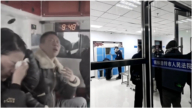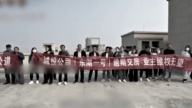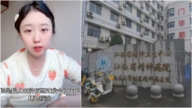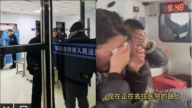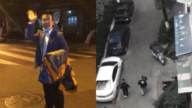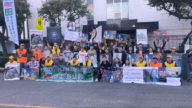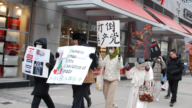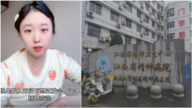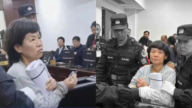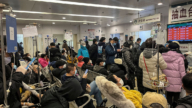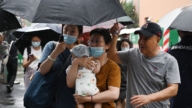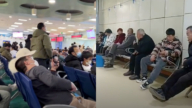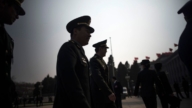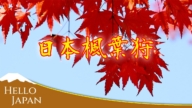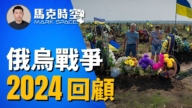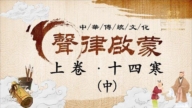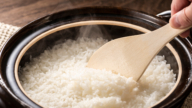【新唐人2014年03月14日訊】據中共最高人民檢察院日前公布的數據,與2012年相較,去年各檢察機關批准逮捕和提起公訴的人數都有所下降。美國人權組織「對話基金」分析指出,中共當局可能用刑事罪來起訴異議人士,以減少政治犯的人數。
3月10號,中共最高檢察院在全國人大會議上公布的數據顯示,去年,中國各檢察機關共批准逮捕各類刑事犯罪嫌疑人近88萬人,比2012年的97萬人下降了10%,被提起公訴的人數也下降了5%。而因「危害國家安全罪」遭起訴的人數,則減少了21%,只有830人。
武漢人權活動家秦永敏:「數字不能說明任何問題,在中國,大家知道,常常說的數字都是假的。關於最高法院公告一些數據,我覺的沒有實質意義。從中國社會現狀看,整個社會正處在矛盾大爆發的前夜,各種各樣的惡性事件層出不窮,舉國上下都出現一些非常極端的案件,難道僅僅是當事人要走那個絕路嗎?應該追究那些更深刻的原因。」
11號,總部位於美國的非政府組織「對話基金會」表示,中共最高檢10號公布的報告顯示,去年中國有830人被當局以「煽動顛覆國家政權罪」等危害國家安全的政治罪名起訴,比2012年下降了21%,是自2007年以來,被起訴政治犯人數最少的一年。但與此同時,去年被控「聚眾擾亂公共秩序罪」的人數與2012年相比,增加了1萬1千人。
「對話基金會」以去年被逮捕的李思華、劉萍和魏忠平為例,說明越來越多的中國異議人士被冠以與危害國家安全無關的罪名。可能是中共當局變換了策略,藉此減少政治犯的人數。
據了解,中國公民劉萍、魏忠平、李思華等人,在劉萍家樓下空地舉牌,聲援因「要求官員公布財產」而被捕的公民趙常青、丁家喜等人,卻被警方以「煽動顛覆國家政權」的罪名拘捕,檢察機關在批准逮捕時,將罪名改為「非法集會」,之後法院又追加「聚眾擾亂公共場所秩序」以及「利用邪教組織破壞法律實施」兩項罪名。
廣東律師隋牧青:「這樣大面積的對民間打壓,並不適用一些很嚴厲的罪名,比如說顛覆啊。他還有一個原因,因為中國政府是對外宣稱沒有政治犯,因為危害國家安全罪,國外都知道,這個就是政治,不適用,如果用過去國際上一些罪名,比如去公共場所尋釁滋事,在國際上就有一個欺騙的作用。」
「對話基金會」負責人康原(John Kamm)表示,大陸「新公民運動」倡導人,也是維權律師的許志永,於2012年到2013年間,組織了數起在中央政府機構外的示威,但沒有受到危害國家安全的指控。今年1月,他被北京第一中級人民法院以「聚眾擾亂公共秩序罪」獲判4年監禁。
康原說,根據中國刑事訴訟法,除非「危害國家安全罪」或有關死刑或無期的案例,其他所有初犯案例都由地區法院審理。如果許志永案件與「危害國家政權」沒有關係,為甚麼他會被中級法院審判?
隋牧青:「其實是把他當作意識形態的敵人來對待,國家的敵人來對待了。比如說會見,與律師會見,違法的監視、監聽,還有開庭的時候,根本就不讓去旁聽,其實這個都是一種政治犯的對待,跟普通的刑事案件是兩件事。」
秦永敏:「他既不是政治犯,也不是刑事犯,許志永先生的訴求是符合當今世界人類最基本的文明價值。不管他的訴求,還是所謂的行動,都不違反任何法律,像這樣的案例,正好是反向之罰,把最傑出的精英所做的好事,當作他的罪來加以抓補,荒唐之極!」
北京異議人士胡佳向《自由亞洲電臺》指出,儘管「擾亂公共秩序」、「尋釁滋事」等罪名的量刑上限,比「顛覆國家政權罪」要短,但這並不代表中共當局對異議人士更為寬容。這只能說明,中共當局比以前更狡詐了,既要達到對內震懾維穩的目地,又要儘可能減少來自國際社會的壓力。
採訪/朱智善 編輯/陳潔 後製/孫寧
Chinese Communist Party Changes Tactics: Political Prisoners Charged With Non-political Crimes.
Data was recently released by the Chinese Communist
Party’s (CCP) Supreme People’s Procuratorate (SPP).
It indicated that the number of arrests and indictments
taking place in 2013 decreased, in comparison to 2012.
The Dui Hua Foundation, which advocates human rights
in China, analyzed that the regime is shifting tactics.
It is prosecuting dissidents to reduce
the number of political prisoners.
On March 10, the SPP annual report was
delivered to the National People’s Congress.
The number of arrests in 2013 dropped to 880,000 from
970,000 in 2012, a decline of more than 10 percent.
Indictments fell five percent.
By 2013, indictments for endangering state security (ESS)
had declined by an estimated 21 percent year-on-year.
There were 830 people indicted,
according to the Dui Hua Foundation.
Qin Yongmin, human rights activist, Wuhan:
“The data says nothing about the real problem.
Everyone in China knows the data is false. I don’t think
the Supreme Procuratorate’s figures mean anything.
China is on the eve of outbreak of internal conflict, with all
sorts of serious incidents taking place throughout the country.
There are more than just isolated cases of extreme
severity. The profound reasons need to be investigated".
On March 10, the Dui Hua Foundation released its
analysis of arrests and indictments in China in 2013.
This was based on data from the SPP.
Chinese indictments for endangering state security had
declined by an estimated 21 percent year-on-year by 2013.
This was based on 830 people being indicted in
2013, and were at their lowest level since 2007.
The number of people indicted for “gathering in crowds to
disturb social order", increased by more than 11,000 in 2013.
The Dui Hua Foundation took dissidents Li Sihua,
Liu Ping and Wei Zhongping as examples
to explain the current change in CCP tactics.
It’s reducing the number of political dissidents
by charging them with crimes that are not
considered to be endangering state security.
It is understood that Liu Ping, Wei Zhongping and
Li Sihua held placards near Liu Ping’s apartment.
This act was to stand in solidarity
with Zhao Changqing and Ding Jiaxi.
Zhao and Ding were arrested for calling
for officials to declare their property.
The police arrested the three of them on
allegations of “inciting subversion of state power".
The prosecutors approved the arrest, but
revised the charge to “unlawful assembly".
The court later added two other crimes. The first
was “gathering in a crowd to disturb public order".
The second was “sabotaging legal enforcement
by organizing and using heretical religion".
Sui Muqing, Guangdong lawyer: “Charges with severe
offenses, such as subversion of state power, are not
applicable within the mass suppression of the society.
Also, the regime has claimed to the world
that there are no political prisoners in China.
The charge of subverting state power is well known as the
charge for political prisoners, so it therefore can’t be applied.
That’s why they have shifted to using other charges.
This includes disturbance in public places,
to deceive the international community."
The Dui Hua Foundation also used the example of the
well-known New Citizens Movement advocate, Xu Zhiyong.
Xu rallied the public to protest at multiple central
government bureaus between 2012 and 2013.
However, he was never charged
with endangering state security (ESS).
Beijing No.1 Intermediate People’s Court
sentenced him to four years’ imprisonment.
In January this year, he was charged with
“gathering a crowd to disturb public order".
“According to the Criminal Procedure Law,
with the exception of ESS cases or cases which
may involve life or death sentences, all trials of
first instance shall be tried by district courts.
If Xu was not charged with ESS (i.e., political) crimes, why
was he tried by an intermediate court?" analyzed Dui Hua.
Sui Muqing: “The regime has treated him
as an ideological enemy, a state enemy.
That is why the illegal surveillance and taping
were conducted during his meetings with lawyers.
Also, there was no public hearing during the
trial. He was treated like a political criminal.
It is completely different from an ordinary criminal case."
Qin Yongmin: “But he is not a criminal,
whether it is political or non-political.
What Mr. Xu Zhiyong demanded was the
most fundamental values of human society.
His quest and his acts have not violated
any law. A case like this is extremely absurd.
They penalize the good deeds of the distinguished elite!"
Beijing dissident Hu Jia spoke
to Radio Free Asia on this issue.
The sentencing caps of crimes such as “disturbing
public order" and “provocation" are shorter than
the crimes for “subversion of state power".
But that does not mean that the
regime is more tolerant to dissidents.
It only explains that the regime is being deceptive.
It is trying to “maintaining domestic stability" and
reduce pressure from the international community.
Interview/Zhu Zhishan Edit/Chen Jie Post-Production/Sun Ning


